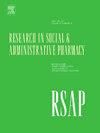Leadership competencies and behaviours in pharmacy: A qualitative content analysis
IF 3.7
3区 医学
Q1 PUBLIC, ENVIRONMENTAL & OCCUPATIONAL HEALTH
Research in Social & Administrative Pharmacy
Pub Date : 2025-02-04
DOI:10.1016/j.sapharm.2025.02.001
引用次数: 0
Abstract
Background
Across complex healthcare systems, effective leadership rises as a cornerstone for improving patient care, promoting innovation, and maintaining a thriving professional landscape. As with most healthcare professions, pharmacists are confronted with medication complexity, changing legislation, and technological integration into healthcare delivery. Lack of leadership in a pharmacy can lead to unorganized medicine dispensing, patient care, and stagnant innovation. Effective leadership requires competencies that blend knowledge, abilities, and behaviours to achieve tasks successfully. Leadership competencies empower pharmacists to lead change in their profession and healthcare system. Despite extensive research and development in various industries, the development of pharmacy leadership competencies and frameworks is limited due to specific challenges. It is essential for the pharmacy profession to continue investing in the development of leadership competencies to drive innovation and improve patient outcomes.
Objective
The objective of the document analysis is to identify pharmacy leadership competencies and analyse related behaviour statements from a global perspective.
Method
This study employs an integrative review utilizing a document analysis to conduct a qualitative content analysis on various sources to identify leadership competencies and behaviours within the pharmacy sector. A systematic approach was followed by searching five electronic databases (Medline, CINAHL, SCOPUS, ERIC, and Google Scholar) in addition to grey literature, policy documents and seeking experts for related documents to ensure comprehensive coverage of relevant field-based literature.
Results
Forty-eight documents were selected for analysis from the literature, most of which originated from Western countries with few representing the Middle East and African countries. Eighteen pharmacy frameworks incorporating leadership competencies were identified, two of which were healthcare frameworks encompassing pharmacists. A total of 96 competencies and 155 behaviour statements were identified from the documents. When grouped and similar competencies conjoined, 8 themes with 34 competencies emerged.
Conclusion
The document analysis portrays a comprehensive picture of the multifaceted landscape of pharmacy leadership competencies. By exploring the eight themes, their associated competencies and behaviour statements this study offers a roadmap for pharmacists to embark on their own leadership journeys. Future research, armed with the clarity and action-oriented language of effective behaviours, can bridge the gap between leadership and tangible impact.
求助全文
约1分钟内获得全文
求助全文
来源期刊

Research in Social & Administrative Pharmacy
PUBLIC, ENVIRONMENTAL & OCCUPATIONAL HEALTH-
CiteScore
7.20
自引率
10.30%
发文量
225
审稿时长
47 days
期刊介绍:
Research in Social and Administrative Pharmacy (RSAP) is a quarterly publication featuring original scientific reports and comprehensive review articles in the social and administrative pharmaceutical sciences. Topics of interest include outcomes evaluation of products, programs, or services; pharmacoepidemiology; medication adherence; direct-to-consumer advertising of prescription medications; disease state management; health systems reform; drug marketing; medication distribution systems such as e-prescribing; web-based pharmaceutical/medical services; drug commerce and re-importation; and health professions workforce issues.
 求助内容:
求助内容: 应助结果提醒方式:
应助结果提醒方式:


